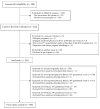Association of Self-Reported Physical Fitness with Pregnancy Related Symptoms the GESTAFIT Project
- PMID: 33804923
- PMCID: PMC8036338
- DOI: 10.3390/ijerph18073345
Association of Self-Reported Physical Fitness with Pregnancy Related Symptoms the GESTAFIT Project
Abstract
We explored the association of physical fitness (PF) with pregnancy-related symptoms, at the 16th and 34th gestational weeks (g.w.). The International Fitness Scale and the Pregnancy Symptoms Inventory were employed to assess self-reported PF and pregnancy-related symptoms, respectively. At the 16th g.w. greater self-reported overall PF was associated with lower incidence of urinary frequency (p = 0.020); greater overall PF, cardiorespiratory fitness (CRF), muscular strength and speed-agility were associated with lower incidence of tiredness-fatigue (all, p < 0.05); greater overall PF and speed-agility were associated with lower incidence of poor sleep (both, p < 0.05); greater CRF and flexibility were associated with lower limitations by tiredness-fatigue (both, p < 0.05); and greater flexibility was associated with lower limitations by poor sleep (p = 0.021). At the 34th g.w. greater self-reported overall PF, CRF and muscular strength were associated with lower incidence of tiredness-fatigue (all, p < 0.05); greater CRF was associated with lower incidence of poor sleep (p = 0.019); and, greater flexibility was associated with lower incidence of increased vaginal discharge (p = 0.023). Adequate levels of PF, especially CRF, may help women to cope with the most endorsed pregnancy-related symptoms and its limitations, especially tiredness-fatigue and poor sleep.
Keywords: International Fitness Scale; agility; cardiorespiratory fitness; flexibility; gestation; pregnancy discomfort.; strength.
Conflict of interest statement
The authors declare no conflict of interest. The funders had no role in the design of the study; in the collection, analyses, or interpretation of data; in the writing of the manuscript, or in the decision to publish the results.
Figures
References
-
- Campolong K., Jenkins S., Clark M.M., Borowski K., Nelson N., Moore K.M., Bobo W.V. The association of exercise during pregnancy with trimester-specific and postpartum quality of life and depressive symptoms in a cohort of healthy pregnant women. Arch. Women’s Ment. Health. 2018;21:215–224. doi: 10.1007/s00737-017-0783-0. - DOI - PubMed
-
- Atkinson L., Teychenne M. Exercise and Sporting Activity During Pregnancy. Springer; Cham, Switzerland: 2019. Psychological, social and behaviour changes during pregnancy: Implications for physical activity and exercise; pp. 19–43.
Publication types
MeSH terms
LinkOut - more resources
Full Text Sources
Other Literature Sources
Medical


